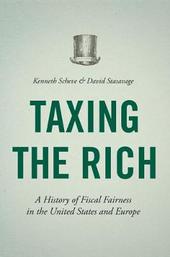
|
Taxing the Rich: A History of Fiscal Fairness in the United States and Europe
Paperback / softback
Main Details
| Title |
Taxing the Rich: A History of Fiscal Fairness in the United States and Europe
|
| Authors and Contributors |
By (author) Kenneth Scheve
|
|
By (author) David Stasavage
|
| Physical Properties |
| Format:Paperback / softback | | Pages:288 | | Dimensions(mm): Height 235,Width 152 |
|
| Category/Genre | Taxation |
|---|
| ISBN/Barcode |
9780691178295
|
| Classifications | Dewey:336.291 |
|---|
| Audience | | Postgraduate, Research & Scholarly | | Professional & Vocational | |
|---|
| Illustrations |
20 b/w illus., 3 tables
|
|
Publishing Details |
| Publisher |
Princeton University Press
|
| Imprint |
Princeton University Press
|
| Publication Date |
7 November 2017 |
| Publication Country |
United States
|
Description
In today's social climate of acknowledged and growing inequality, why are there not greater efforts to tax the rich? In this wide-ranging and provocative book, Kenneth Scheve and David Stasavage ask when and why countries tax their wealthiest citizens--and their answers may surprise you. Taxing the Rich draws on unparalleled evidence from twenty c
Author Biography
Kenneth Scheve is professor of political science and senior fellow at the Freeman Spogli Institute for International Studies at Stanford University. He is the coauthor of Globalization and the Perceptions of American Workers. David Stasavage is Julius Silver Professor in the Wilf Family Department of Politics at New York University. He is the author of States of Credit: Size, Power, and the Development of European Polities (Princeton).
ReviewsOne of Bloomberg's Best Books of 2016 "These findings run counter to a popular narrative. Recall that in 2012, Mitt Romney said that in a democracy, a candidate who offers tax breaks to the less well-off at the expense of the rich will win mass support 'no matter what.' That claim does not appear to be supported by the historical record."--Robert J. Shiller, New York Times "In its big picture argument the book is convincing: on both the correlation and nature of causality between wars that required the mass of working people to sacrifice not just their labour but also their lives; and on the imposition of higher tax rates on the rich in the 20th century."--Torsten Bell, Prospect "A sweeping look at the history of levies on the wealthy."--Hugo Greenhalgh, Financial Times "[Scheve and Stasavage] flesh out their big picture with a mass of compelling evidence. Overall, an outstanding book."--Bryan Caplan, EconLog "What is surprising about this book is how robustly the authors discount other widely held explanations for the gradual reduction in tax paid by the richest 1% since 1980. The influence of political lobbying, liberalised capital flows and the breakdown of the postwar consensus are, in their view, inadequate answers. What has changed is the focus of 'equality of sacrifice,' which has returned to a debate about fairness."--Zac Tate, Capx "Apart from anything else, the historical data on top tax rates is fascinating."--Diane Coyle, Enlightened Economist "[A] fine and stimulating book."--Financial Post "More than any other book I've read in the past few years, their arguments have prompted me to review what they wrote and look for other research that supports or counters their points."--David Cay Johnston, Tax Notes "The authors make the force of the compensatory view clear. Judging by the apparent success of the rhetoric during the 2016 U.S. presidential primaries that speaks of a system rigged to favor the rich, the compensatory theory has not gone unnoticed by political strategists."--Michael Keen, Finance & Development Magazine "[A] fine model of social science research."--Richard Cooper, Foreign Affairs "Taxing the Richexplains why the problems of America's poor and angry are unlikely to be solved by redistributive taxation."--Angus Deaton, Bloomberg
|